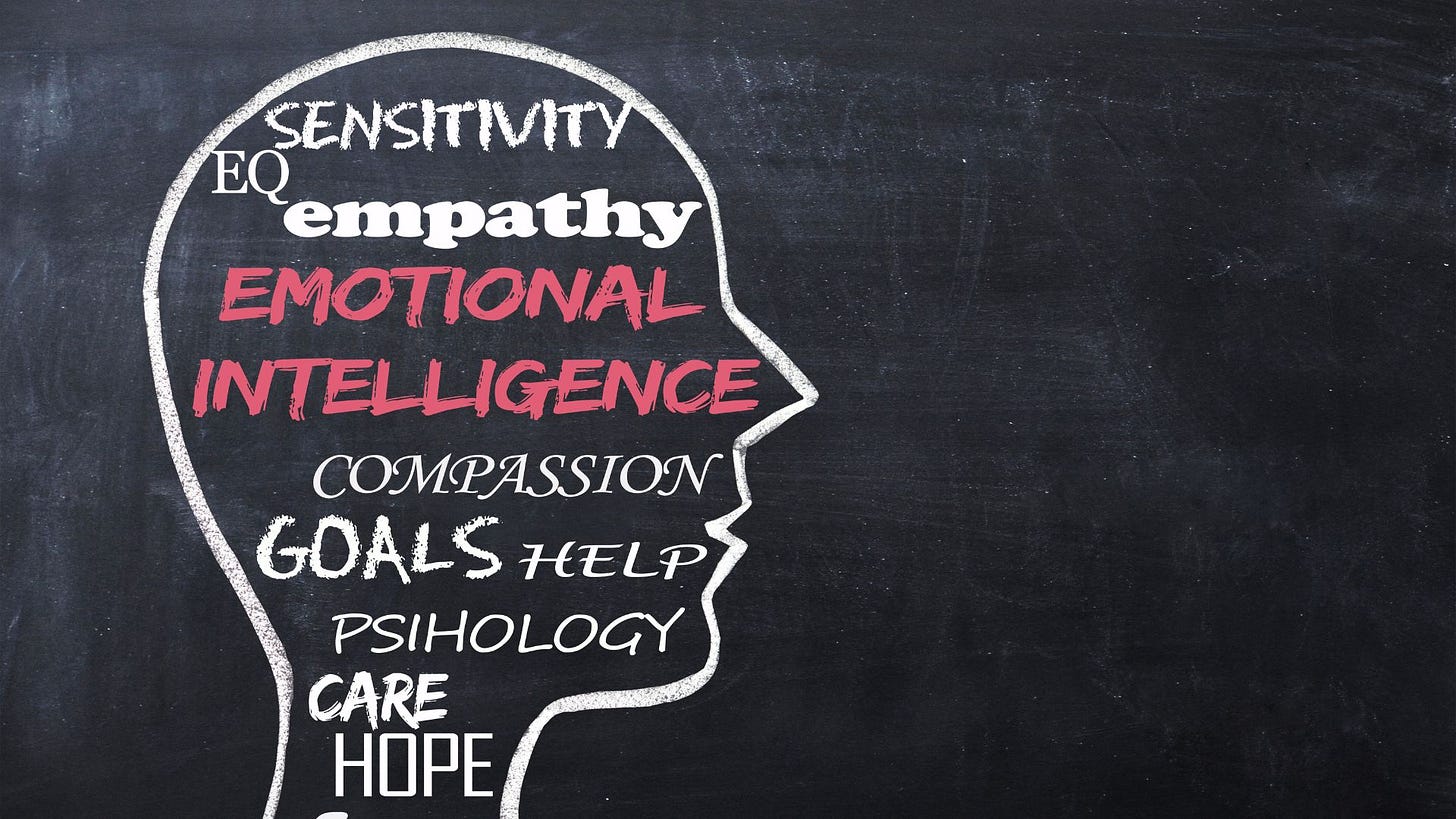Embarking on a Journey of Leadership Mastery: Your Ultimate Guide: Part Two
In this article, you're going to explore the ins and outs of effective leadership development and uncover strategies that will propel you toward leadership excellence.
Emotional Intelligence
Welcome to the captivating world of emotional intelligence – a realm where understanding and harnessing emotions becomes your superpower as a leader. In a landscape where technical skills are essential but not sufficient, emotional intelligence is the thread that weaves through every successful leader's tapestry.
Recognizing the Impact of Emotional Intelligence on Leadership Effectiveness
Picture a leader who's not just a figurehead but a genuine source of inspiration. This kind of leader possesses a unique quality that goes beyond skills – emotional intelligence. It's the X-factor that separates a good leader from a great one. When you're emotionally intelligent, you can decipher the unspoken sentiments in a room, gauge the morale of your team, and navigate interpersonal dynamics with finesse.
Think of emotional intelligence as a compass that guides you through the labyrinth of human interactions. As a leader, your impact reverberates far beyond your technical expertise; it resonates through the relationships you forge and the culture you cultivate. By understanding how emotions drive behavior, you can tailor your leadership approach to motivate, uplift, and empower those around you.
Strategies to Develop Self-Awareness and Empathy
Embarking on the journey of emotional intelligence is like unveiling a hidden treasure within yourself – a treasure that holds the keys to unlocking deeper connections and more effective leadership. In this section, we'll dive into the strategies that can help you develop self-awareness and empathy, two essential components of emotional intelligence that will elevate your leadership to extraordinary heights.
Reflect Regularly: Regular self-reflection is akin to holding a mirror to your actions, thoughts, and emotions. Set aside dedicated time to contemplate your interactions, decisions, and their outcomes. Ask yourself probing questions: How did I respond to that situation? Why did I feel a certain way? Reflecting on your behavior and its impact on others cultivates self-awareness. Over time, patterns emerge, and you gain a clearer understanding of your strengths, weaknesses, and areas for growth. This self-awareness becomes a compass that guides your leadership journey, allowing you to make conscious choices aligned with your values.
Put Yourself in Others' Shoes: Empathy is the ability to step into someone else's shoes and truly understand their emotions and perspectives. To enhance empathy, practice this mental exercise regularly. When engaging with others, consciously imagine their feelings, thoughts, and experiences. Consider the challenges they might be facing and the emotions they could be grappling with. This practice helps you transcend your own viewpoint and create a genuine connection with others. As you develop the habit of empathetic imagining, your relationships become more meaningful and authentic.
Read Emotional Cues: Communication extends beyond words; it's woven with subtle nonverbal cues. Paying attention to body language, facial expressions, tone of voice, and gestures provides insights into others' emotions. These cues offer valuable information about how someone is feeling, even when they don't explicitly express it. By honing your ability to read emotional cues, you gain a deeper understanding of what lies beneath the surface. This skill enables you to respond sensitively to others' needs and concerns, fostering empathy in your interactions.
Practice Emotional Regulation: Emotions are an integral part of the human experience, and recognizing and regulating them is key to developing self-awareness and empathy. Emotional regulation involves understanding your emotional triggers and responding to them in a balanced way. When you encounter a situation that stirs strong emotions, take a moment to pause and reflect. Acknowledge your feelings without judgment and consider how best to respond. By practicing emotional regulation, you become attuned to your emotional landscape, enabling you to navigate situations with greater self-awareness and empathy.
Empathy Mapping: Empathy mapping is a structured exercise that enables you to deeply understand others' perspectives. Create a simple diagram with four quadrants: "Says," "Thinks," "Feels," and "Does." Fill in each quadrant based on what you know about the person's verbal and non-verbal cues. This visualization exercise helps you step into their shoes, capturing their thoughts, emotions, actions, and concerns. Empathy mapping is a powerful tool that enhances your ability to grasp others' experiences and tailor your interactions accordingly.
Journaling: Journaling serves as a reflective practice that encourages self-awareness and empathy. Dedicate time to journal your thoughts, emotions, and experiences. Writing provides a safe space to explore your feelings and reactions to various situations. Over time, as you revisit your journal entries, you gain insights into your emotional responses, triggers, and growth journey. This practice also encourages empathy by helping you recognize common human struggles and challenges. As you immerse yourself in your own thoughts and emotions, you become better equipped to relate to and understand others.
By integrating these strategies into your daily leadership practices, you embark on a journey of self-discovery and connection. Self-awareness and empathy lay the foundation for meaningful relationships, effective communication, and impactful leadership that resonates with authenticity and emotional intelligence.
Techniques to Regulate Emotions and Harness Emotional Intelligence in Leadership
In the intricate dance of leadership, emotions can often become the lead. They can dictate your decisions, sway your interactions, and influence your team's dynamics. The good news is that you have the power to take the lead back – to regulate your emotions and wield emotional intelligence as a guiding force. In this section, we'll explore techniques that empower you to do just that, enabling you to navigate the highs and lows of leadership with grace and wisdom.
Mindfulness: Anchoring in the Present Moment: Mindfulness offers a haven where the noise of thoughts recedes, allowing you to be fully present. As a leader, practicing mindfulness empowers you to respond to situations with clarity. Dedicate minutes daily to mindfulness exercises. Focus on your breath, noting its rhythm. Acknowledge thoughts without judgment, guiding your attention back to your breath. Mindfulness isn't about silencing your mind; it's about observing thoughts without entanglement. Integrating mindfulness cultivates present-centered decisions.
Deep Breathing: Calming the Storm Within: Deep breathing is your lifeline, accessible anytime. Amid stress, emotions, or racing thoughts, deep breathing anchors you. Breathe slowly through your nose, expanding your abdomen, and exhale through your mouth. This rhythm signals safety, invoking relaxation. Amid challenges, pause, and take deep breaths. This grants room to step back from turmoil, respond with clarity. Deep breathing incorporation maintains composure amidst chaos
Reframing Negative Thoughts: Shifting Perspectives: Reframing turns setbacks into growth paths. When adversity strikes, ask: "What can I learn?" or "How can I turn this into opportunity?" By reframing, you convert negativity into catalysts for development. This technique transcends immediate struggle, uncovering silver linings in darkness. As a leader, it inspires your team to view challenges as steps toward progress. Reframing propels you beyond obstacles, fostering growth-oriented mindsets.
As we journey through the territories of leadership mastery, keep your emotional intelligence compass close. It's your guide to building meaningful relationships, navigating challenging conversations, and making decisions that resonate deeply with those you lead.
Our next stop is Part Three: Resilience and Adaptability, where we'll delve into the art of thriving amidst change and bouncing back from setbacks. So, let your emotional intelligence light the way as we continue on this transformative path toward leadership excellence.






